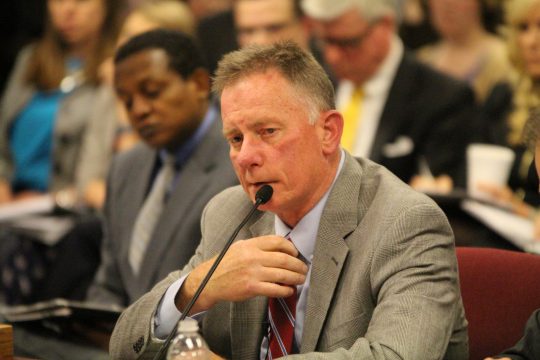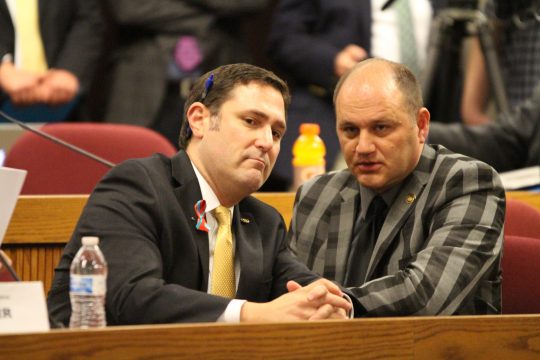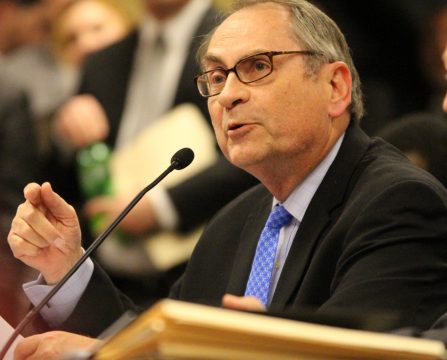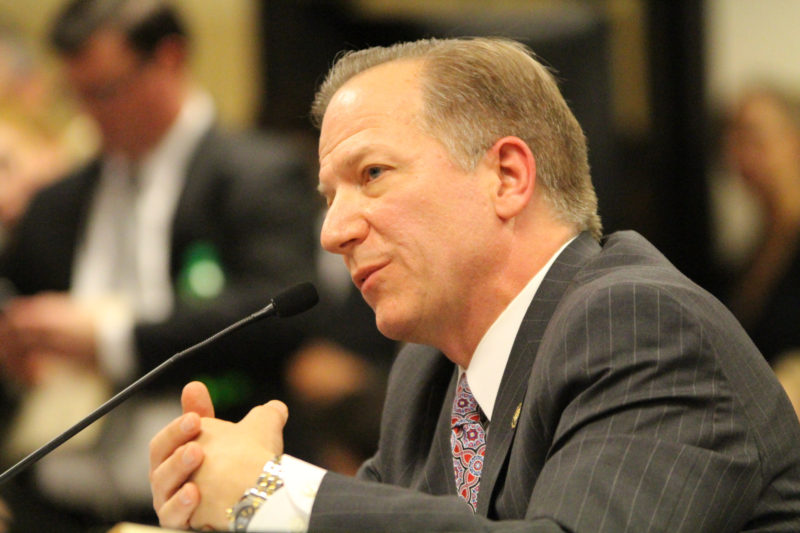JEFFERSON CITY, Mo. – If the Senate Democrats’ objective in filibustering SJR 39, the “religious liberty” bill authored by Sen. Bob Onder, R-O’Fallon, was to draw attention to the issue, then it is fair to say the filibuster was a rousing success.
The Emerging Issues Committee hearing on SJR 39 filled the largest hearing room in the Capitol building Tuesday night, and it did not even begin to empty until near 11:30 p.m. A quarter past midnight when the committee adjourned, it was still standing room only. Both supporters and opponents of the legislation were heard in equal measure, with religious liberty lawyers and faith leaders calling the resolution one that would prevent discrimination against those with religious convictions and business leaders civil rights leaders arguing it would guarantee discrimination against members of the LGBT community.
“No matter what side, somebody’s ox is getting butchered,” said Committee Chair Elijah Haahr, R-Springfield. “Whether its the religious community trying to not just maintain commerce but maintain their objections or it’s the LGBT community trying to be completely free of discrimination and shop wherever they want, someone is going to lose, and it’s a very difficult balancing test.”
Haahr reiterated his own support for the legislation after nearly 5 hours of testimony, saying that because it was such a difficult issue it should be left up to the voters. The resolution, if passed by both chambers, would be a ballot issue on either the August or November ballot at the discretion of Gov. Jay Nixon.
Rep. Bill Lant, R-Pineville, in his first words of the evening, echoed similar sentiment as the committee adjourned.
“I see the bottom line here that the people of Missouri need to make this decision,” he said. “For the ten or fifteen of us to make a decision is the height of arrogance. This needs to go to the voters.”
The five hours of debate brought clashes over constitutional law, the protections afforded by the First Amendment, the economic impact of the state, and exactly which group was being discriminated against. Front and center in the first hour of debate was Onder, who was grilled by House Democrats on the committee and interrogated by many of its Republicans.
Onder first refuted the claim that the business community opposed his legislation and then chastised those who had publicly come out in opposition to it.

“First, I’d like to address this myth that the business community opposes SJR 39. I’d say the business elites oppose SJR 39,” he said. “The threats, the boycotts, the bullying that we’re seeing in Missouri… I think a lot of that concern is overblown and hyperbole. Why do businesses oppose letting the people of Missouri decide?
“The corporations who make their money from folks like you and me who overwhelmingly support religious freedom turn around and use this to tell us if we protect our fellow citizens from persecution, they are going to punish us… I find that appalling.”
However, the business community did show up in full force, with the Missouri Chamber’s Dan Mehan arguing that it could prove as a disincentive for business within the state.
“Large companies and small companies alike, of our 300 member businesses, we have not had one company come forward asking us to support this measure,” he said.

Rep. Mike Colona, D-St. Louis, one of the most vocal opponents of the bill, noted that the St. Louis Chamber of Commerce had essentially told him the same thing, and pointed to examples like Indiana’s loss of revenue due to a similar measure last year and the recent decision by some companies not to do business with North Carolina after they passed a law many viewed was aimed at the LGBT community.
“I talk to my regional chamber folks and it’s almost as if the proof is in the pudding,” Colona said. “We can point to concrete economic deactivity.”
The economic argument was hit on all night by the bills’ detractors. Sports commissions from St. Louis and Kansas City both expressed their concerns that major sports organizations would no longer come to the state if such a provision passed, the Kansas City Convention and Visitors Association said some groups had already approached them about no longer holding events in the city and Warren Erdmann of Kansas City Southern, who noted that he was a “card-carrying Republican” said that it would be “cataclysmic” to the state’s ability recruit and retain top talent.
That was a sentiment shared by Rep. Anne Zerr, R-St. Charles, and she was perhaps the most openly skeptical Republican of the bill on the evening.
“I’m not convinced this bill, as it is, doesn’t take away some of the rights of others,” she said at one point.
However, she also constantly asked questions of the resolution’s supporters to amend the law to remove the language that would exempt businesses and let it apply to just to religious clergy. She described it throughout the evening as trying to find an acceptable balance.
Steph Perkins from PROMO, Missouri’s foremost LGBT advocacy group, also noted that this bill sent the wrong message about Missouri.
“We too believe religious liberty is an important value… but SJR 39 is not about religious liberty. It goes way too far,” he said. “You are sending an incredibly clear message that LGBT people, their friends, their families, the people that love them, are unwelcome in this state. You are doing this even if it does not go to the ballot.”
For all of its detractors, the bill certainly had its supporters as well. Most notably, Lt. Gov. Peter Kinder offered his own support for the bill.
“This is not about discrimination, it is purely about letting voters decide,” he said. “SJR 39 is another piece of the fabric of religious liberties that every American enjoys.”
Mike Whitehead, the general counsel for the Missouri Baptist Convention, argued the people had the constitutionally protected, and fundamental right to practice their sincerely held religious beliefs, whether they be members of clergy or congregation, and that, as such, if someone’s religious beliefs opposed marriage between same-sex couples, then they had a right to object if their services were required for such a union.

“Religious belief in traditional marriage is not the same as bigotry,” Whitehead said.
When Rep. Ron Hicks, R-St. Peters, noted he would not want to solicit a business that discriminated against him.
“If I was a gay man, I would want to take my business some place else,” Hicks said.“If he’s not gonna make my cake, that’s his problem.”
Pastor Phil Hopper of Lee’s Summit noted that even though this specific legal challenge had not yet come to Missouri, that these kinds of legislation were a “pre-emptive effort” on the part of those with religious conviction to protect their constitutional rights.
“There are a lot of members of the clergy that no longer believe the First Amendment protects them,” he said.
The Missouri Farm Bureau, which represents over 100,000 farmers, also endorsed the legislation.
The burning of the midnight oil has become something of a tradition for SJR 39. Debate has raged over the bill even before the 39-hour filibuster that locked up the Senate for the better part of a week. After it was passed via a previous question vote that ended debate, those supporting and opposing the bill have focused their attentions on the House.
Some of the most interesting reaction to the bill however has come from outside Missouri as other states pass similar legislation or bills that gay rights advocacy groups and other liberal organizations posit discriminates against the LGBT community. The business community has also taken notice. When North Carolina Governor Pat McCrory passed a bill in March that would create non-discrimination policies based on gender identity and mandate that people use the public bathroom that matched the gender on their birth certificate, PayPal canceled plans to open an operations center in Charlotte, an investment of nearly $4 million. After Mississippi passed a bill similar to SJR 39 last week, Tyson Foods, Toyota and Nissan; all major employers in the state; spoke out against it. Bruce Springsteen and Bryan Adams even cancelled shows in those two states respectively because of the new laws.
The business community in Missouri has also become one of the driving forces of opposition to the resolution. The Missouri, Kansas City and St. Louis Chambers of Commerce have all come out in opposition to the bill, as have major employers like Dow Chemical and Monsanto, arguing that passing such legislation could drive away businesses and talented individuals.
“SJR 39… redefines the term religious organization’ so that any for-profit business can self-declare itself a religious organization and then discriminate against same sex couples in employment, housing and public accommodations,” Duane Simpson, State and Local Government Affairs for Monsanto, said in his written testimony. “As drafted, this legislation will impair our ability to compete for world class talent. It would make our employees and their family members less secure in their daily lives.
“It would harm the reputation of our entire state, potentially costing the state millions of dollars in economic activity and untold losses in the dignity every citizen of Missouri deserves.”
Small businesses, for the most part, have also stated their opposition to such a measure. During the Senate filibuster, Sen. Jill Schupp, D-St. Louis spent hours listing businesses in Missouri opposed to the resolution.
The stand in opposition by businesses had strained the usually strong relationship they have with conservatives in the Capitol.
“It has been one month since the Senate passed SJR 39 after enduring a historic 40-hour filibuster. Since that time, there has been much hyperbole and misinformation from the left and their big business cronies,” Ryan Johnson, the president of the Missouri Alliance for Freedom, said in a release Monday. “Missourians overwhelmingly believe citizens should not be forced by the government to violate their deeply-held religious beliefs which are protected by our Constitution. The government should not be able to force clergy, citizens or business owners to take action against their religious beliefs.”
Rep. Sheila Solon, R-Blue Springs, however disagrees that clergy, citizens and businesses’ religious beliefs are not currently protected. Solon has, so far, been the only Republican representative to publicly speak against the resolution because of her interpretation of the Religious Freedom Restoration Act of 2003. She believes the new law could weaken the existing law.
“We already have laws in the statute that give religious freedom and liberty to everyone, so my fear is that we have such a narrow bill pass that it actually may end up in a way taking away some of the freedoms that we already have,” she said. “We already have statutes that take care of this. By narrowing it so much, making it so specific and enshrining it in our constitution, we could very well be taking away some of the freedom we already have.”
Solon added that she had concerns the bill was a constitutional amendment when she believes a statutory change could produce the desired result without “enshrining” the policy in the constitution. She also says the possible backlash from businesses is an unnecessary risk.
“Why would we risk losing so much business… and economic development for a bill that in my opinion could very well be unnecessary?” she said. “So I think we should be looking at this very carefully. I think if it could do this much financial damage to our state, we better make sure that it’s something that we need to do.”
Solon also hinted that more Republicans than her wanted to give SJR 39 a second look. House Speaker Todd Richardson, R-Poplar Bluff, also indicated his own doubts that everyone was on board with the resolution.
“I’m not sure that I could pick out any issue that has 100 percent support in our caucus,” he said. “We’re a diverse caucus. When you have a caucus that’s 116 members large in a state as diverse as Missouri is, you’re going to have a lot of different kinds of Republicans. But I know that our caucus is going to work through this issue the same way we’ve worked through others.”
Richardson, however, remains confident the measure will pass through the committee and House, although he noted that he did not dictate to Haahr that it escape unaltered.
“It’s my preference to help lead the House to what the will of House is, and there is certainly a desire amongst some in the Senate and some in the House to pass that clean,” Richardson said. “I’m certainly not going to tell my chairmen that they have a specific order to keep bills clean. Now, I want my chairmen in all instances to give legislation a thorough and fair vetting and if in their estimation the bill is right and good as it is, then pass it clean.”
Haahr indicated after the hearing that he would like to get it through without amendments.








